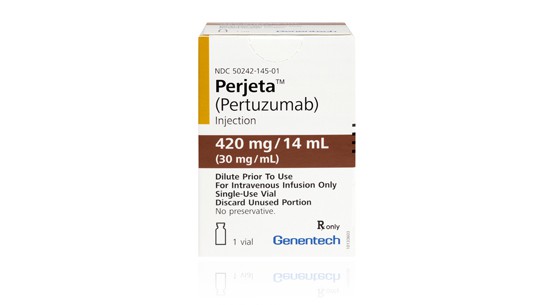
The Scottish Medicines Consortium (SMC) has not recommended Roche’s Perjeta for use in the treatment of unresectable breast cancer.
The news comes after Perjeta (pertuzumab) was resubmitted for consideration under the end of life/orphan medicine process for adult patients with HER2-positive metastatic or locally recurrent unresectable breast cancer.
The drug was proposed to be used in combination with trastuzumab and docetaxel for those who had not received previous anti-HER2 therapy or chemotherapy for their metastatic disease.

Perjeta demonstrated “phenomenal” results at the European Society for Medical Oncology (ESMO) meeting in September
The SMC said the decision was due to Roche’s lack of ‘sufficiently robust economic analysis’ and justification of the treatment’s cost in relation to its health benefits.
Perjeta has previously turned down for NHS reimbursement in England due to negative guidance from the National Institute for Health and Care Excellence (NICE), although the drug is available via the Cancer Drugs Fund.
Eylea, Afinitor, Daklinza, Yervoy and Onglyza all get thumbs up
Elsewhere, the SMC backed reimbursement for several drugs within NHS Scotland.
Bayer’s Eylea (aflibercept) has been accepted for restricted use in adults with visual impairment due to diabetic macular oedema (DMO). However, the SMC restricted use of the drug to adults with best-corrected visual acuity (BCVA) 75 Early Treatment Diabetic Retinopathy Study (ETDRS) letters or less at baseline.
Afinitor (everolimus), marketed by Novartis, was backed for patients with advanced renal cell carcinoma, whose disease has progressed on or after treatment with vascular endothelial growth factor (VEGF)-targeted therapy.
Bristol-Myers Squibb (BMS) had two drugs recommended by the SMC. Daklinza (daclatasvir) was accepted for use in combination with other products for the treatment of chronic hepatitis C virus (HCV) infection in adults, while Yervoy (ipilimumab) was also given the go ahead for the treatment of advanced melanoma in adults.
However, the SMC restricted use of Daklinza to patients with significant fibrosis (Metavir scores F3-F4) or compensated cirrhosis.
The SMC also recommended the use of AstraZeneca’s Onglyza (saxagliptin) in adult patients with type 2 diabetes mellitus to improve glycaemic control as combination therapy with insulin (with or without metformin), when this regimen alone, with diet and exercise, does not provide adequate glycaemic control.




